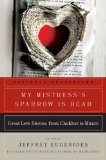Summary | Excerpt | Reviews | Beyond the Book | Readalikes | Genres & Themes | Author Bio

Critics' Opinion:
Readers' Opinion:
First Published:
Jan 2008, 608 pages
Paperback:
Jan 2009, 600 pages
 Book Reviewed by:
Book Reviewed by:
Lucia Silva
Buy This Book
INTRODUCTION
1: Lesbia's Sparrow
The Latin poet Catullus was the first poet in the ancient world to write about a personal love affair in an extended way. Other poets treated the subject of "love," allowing the flushed cheeks or alabaster limbs of this or that inamorata to enter the frame of their poems, but it Catullus who built his nugae, or trifles, around a single, near-obsessional passion for a woman whose entire presence, body and mind, fills the lines of his poetry. From the first excruciating moments of infatuation with the woman he called "Lesbia," through the torrid transports of physical love, to the betrayals that leave him stricken, Catullus told it all, and, in so doing, did more than anyone to create the form we recognize today as the love story.
Gaius Catullus was born around 84 B.C., in Cisalpine Gaul, the son of a minor aristocrat and businessman with holdings in Spain and Asia Minor, and lived until roughly the age of thirty. It was as a very young man, then, that he found his way to poetry — and to Lesbia.
Lesbia wasn't her real name. Her real name was Clodia. Classical scholars disagree over whether she was the Clodia married to the praetor Metellus Celer, infamous for her licentiousness and possible matricide. Lesbia might have been one of Clodia's sisters, or another Clodia altogether. What's certain is that she was married and that Catullus's relationship with her was adulterous. Though, like many adulterers, Catullus disapproved of adultery (in poem LXI he writes, "Your husband is not light, not tied/To some bad adulteress,/Nor pursuing shameful scandal/Will he wish to sleep apart/From your tender nipples,"), he found himself, in the case of Clodia/Lesbia, compelled to make an exception. He became involved with a wicked aristocratic Roman lady who used him as a plaything, or — the alternate version — he fell for a fashionable, married Roman girl, who ended up sleeping with his best friend, Rufus. Whatever the details, one thing is clear: a great love story had begun.
Of Catullus's many hendecasyllabics devoted to his relationship with Lesbia, only two concern us here. The first two. The poems having to do with Lesbia and her pet sparrow.
Sparrow, my girl's darling
Whom she plays with, whom she cuddles,
Whom she likes to tempt with finger-- --
Tip and teases to nip harder
When my own bright-eyed desire
Fancies some endearing fun
And a small solace for her pain,
I suppose, so heavy passion then rests:
Would I could play with you as she does
And lighten the spirit's gloomy cares!
That's poem II. Poem II A is a fragment. And by poem III Lesbia's sparrow is dead. "[P]asser mortuus est meae puellae,/passer, deliciae meae puellae,/quem plus illa oculis suis amabit," Catullus writes, which translates as, "My girl's sparrow is dead,/Sparrow, my girl's darling,/Whom she loved more than her eyes." (Incidentally, this poem, or more specifically, the onomatopoeia of its two central words, "passer" and "pipiabat," did more than anything I can remember to make me want to become a writer. I can still hear our Latin teacher, Miss Ferguson, piping out in her most piercing sparrow's voice, "passer pipiabat," getting us to notice how much the plosive rhythm resembled a bird singing. That words were music, that, at the same time they were marks on a page, they also referred to things in the world and, in skilled hands, took on properties of the things they denoted, was for me, at fifteen, an exciting discovery, all the more notable for the fact that this poetic effect had been devised by a young man dead for two thousand years, who'd sent this phrase drifting down the centuries to reach me in my Michigan classroom, filling my American ears with the sound of Roman birdsong.)
Excerpted from My Mistress's Sparrow Is Dead by Jeffrey Eugenides. Copyright © 2008 by Jeffrey Eugenides. Excerpted by permission of HarperCollins Publishers. All rights reserved. No part of this excerpt may be reproduced or reprinted without permission in writing from the publisher.





The Funeral Cryer by Wenyan Lu
Debut novelist Wenyan Lu brings us this witty yet profound story about one woman's midlife reawakening in contemporary rural China.
Your guide toexceptional books
BookBrowse seeks out and recommends the best in contemporary fiction and nonfiction—books that not only engage and entertain but also deepen our understanding of ourselves and the world around us.